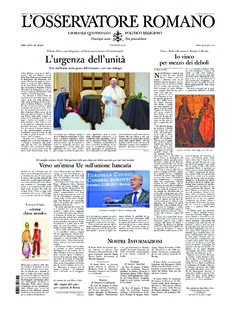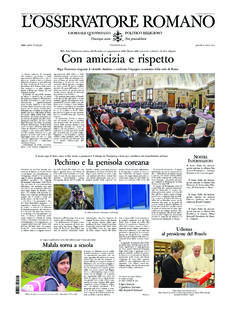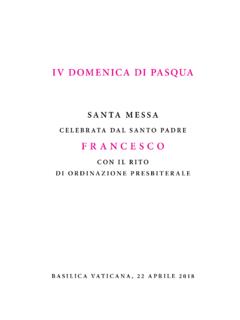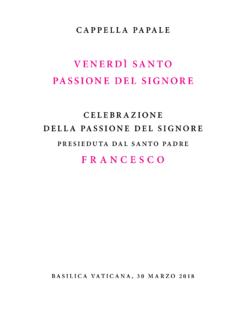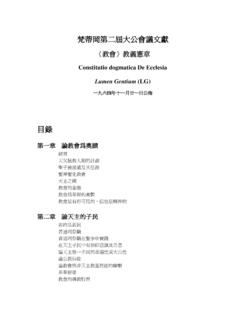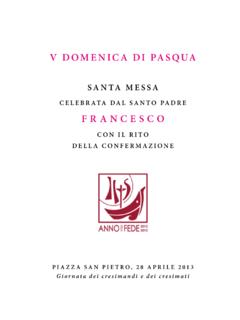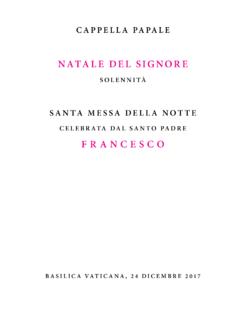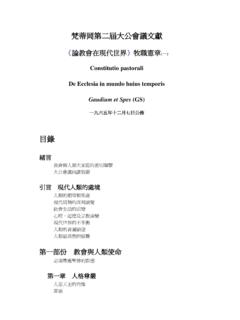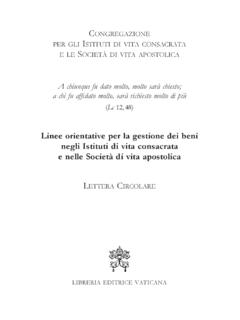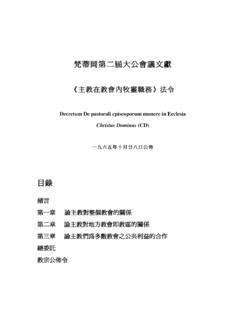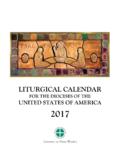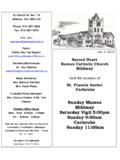Transcription of Walking Together on the Way - vatican.va
1 Walking Together on the Way Learning to Be the church Local, Regional, Universal An Agreed Statement of the Third Anglican roman catholic International Commission (ARCIC III) Erfurt 2017 i Contents Abbreviations Usage of Terms Preface The Status of the Document I. Introduction II. The church Local and Universal in the Apostolic and Post-Apostolic Periods III. Ecclesial Communion in Christ: The Need for Effective Instruments of Communion IV. Instruments of Communion at the Local Levels of Anglican and roman catholic Life V. Instruments of Communion at the Regional Levels of Anglican and roman catholic Life VI. Instruments of Communion at the Worldwide/Universal Level of Anglican and roman catholic Life Conclusion: Growing Together into the Fullness of Christ Bibliography Members of the Commission Abbreviations AA Second vatican Council, Apostolicam Actuositatem.
2 Decree on the Apostolate of the Laity (1965) ACC Anglican Consultative Council AL Pope Francis, Amoris L titia. Post-Synodal Apostolic Exhortation on Love in the Family (2016) ARCIC Anglican roman catholic International Commission AS Pope John Paul II, Apostolos Suos. Apostolic Letter issued Motu Proprio on the Theological and Juridical Nature of Episcopal Conferences (1998) Auth I ARCIC I, Authority in the church I (Venice, 1976) Auth I Elucidation ARCIC I, Authority in the church I: Elucidation (Windsor, 1981) Auth II ARCIC I, Authority in the church II (Windsor, 1981) CaC ARCIC II, church as Communion (1991) CCEO Pope John Paul II, Codex Canonum Ecclesiarum Orientalium. The Code of Canons of the Eastern Churches (1990) CD Second vatican Council, Christus Dominus.
3 Decree Concerning the Pastoral Office of Bishops in the church (1965) CFL Pope John Paul II, Christifideles Laici. Apostolic Exhortation on the Vocation and the Mission of the Lay Faithful in the church and the World (1988) CIC Pope John Paul II, Codex Iuris Canonici. The Code of Canon Law of the catholic church (1983) CN Congregation for the Doctrine of the Faith, Communionis Notio. Letter to the Bishops of the catholic church on some Aspects of the church Understood as Communion (1992) ED ARCIC I, Eucharistic Doctrine (1971) EE Pope John Paul II, Ecclesia de Eucharistia. Encyclical Letter on the Eucharist in Its Relationship to the church (2003) EG Pope Francis, Evangelii Gaudium. Apostolic Exhortation on the Proclamation of the Gospel in Today s World (2013) EV Pope John Paul II, Evangelium Vitae.
4 Encyclical Letter on the Value and Inviolability of Human Life (1995) Gift ARCIC II, The Gift of Authority (Authority in the church III) (1999) GTUM IARCCUM, Growing Together in Unity and Mission: Building on 40 Years of Anglican roman catholic Dialogue (2007) IARCCUM International Anglican roman catholic Commission for Unity and Mission IASCUFO Report The Inter-Anglican Standing Commission for Unity, Faith and Order, Report to ACC-15 (2012) i LC Lambeth Conference (followed by date) LG Second vatican Council, Lumen Gentium. The Dogmatic Constitution on the church (1964) LiC ARCIC II, Life in Christ: Morals, Communion and the church (1994) Mary ARCIC II, Mary: Grace and Hope in Christ (2005) MIDI Pope Francis, Mitis Iudex Dominus Iesus.
5 Apostolic Letter Motu Proprio by which the Canons of the Code of Canon Law Pertaining to Cases Regarding the Nullity of Marriage are Reformed (2015) MO ARCIC I, Ministry and Ordination (1973) OA Pope Paul VI, Octogesima Adveniens. Apostolic Letter on the Occasion of the Eightieth Anniversary of the Encyclical Rerum Novarum (1971) OS Pope John Paul II, Ordinatio Sacerdotalis. Apostolic Letter on Reserving Priestly Ordination to Men Alone (1994) PCL Principles of Canon Law Common to the Churches of the Anglican Communion (2008) PO Second vatican Council, Presbyterorum Ordinis. Decree on the Ministry and Life of Priests (1965) S&C ARCIC II, Salvation and the church (1987) SC Second vatican Council, Sacrosanctum Concilium. Constitution on the Sacred Liturgy (1963) SFLC International Theological Commission, Sensus Fidei in the Life of the church (2014) TCTCV World Council of Churches, The church : Towards a Common Vision.
6 Faith and Order Paper No. 214 (Geneva: WCC Publications, 2013) TSI The Inter-Anglican Standing Commission for Unity, Faith and Order, Towards a Symphony of Instruments: A Historical and Theological Consideration of the Instruments of Communion of the Anglican Communion (2015) TT International Theological Commission, Theology Today: Perspectives, Principles, and Criteria (2011) UR Second vatican Council, Unitatis Redintegratio. Decree on Ecumenism (1964) UUS Pope John Paul II, Ut Unum Sint. Encyclical on Commitment to Ecumenism (1995) VR The Virginia Report of the Inter-Anglican Theological and Doctrinal Commission (1997) WCC World Council of Churches WR The Lambeth Commission on Communion, The Windsor Report (2004) WT IARCCUM, Walking Together : Common Service to the World and Witness to the Gospel (2016) ii Usage of Terms In their respective documents Anglicans and roman Catholics sometimes use the same terms in different ways.
7 For both precision and ease of comprehension the Commission here explains its use of the following terms. Bishop of Rome In this, as in previous ARCIC Agreed Statements, the Pope, variously referred to as the Supreme Pontiff, the Servant of the Servants of God, the Holy Father, and other historic titles, is normally styled Bishop of Rome. It is because the particular church of Rome is where both Saints Peter and Paul laboured and were martyred that the See of Rome and its bishop, successor Petri, enjoy a pre-eminent authority and honour in the universal church . Catholics While recognizing that the term catholic is used by a wide variety of Christian traditions, the Commission uses Catholics to refer to all who are in full communion with the Bishop of Rome, recognizing that Eastern Rite Catholics (as above) would not self-describe as roman Catholics.
8 church catholic The Commission uses church catholic in reference to the one church of Christ. Deliberative In this statement to deliberate connotes to discuss and debate ; deliberative denotes authorized to reach a decision . Deliberative thus means that a particular body, a synod, can decide a matter of policy by an authoritative vote. Eastern catholic Churches There are twenty-three Eastern catholic Churches that are in full communion with the Bishop of Rome. Together they constitute just over 1 per cent, or 16 million, of the faithful of the catholic church . With the exception of the Maronite church , all these churches have come into full communion with the Bishop of Rome since the sixteenth century; however, they have retained their liturgical rites, which they share in common with the Eastern and Oriental Orthodox churches from which they originate.
9 They are headed by patriarchs, major archbishops, and metropolitans and are governed by the Code of Canons of the Eastern Churches (1990), though each has its own Canon Law in addition to this Code. Instruments of communion The Commission uses instruments of communion to refer in this document to respective Anglican and roman catholic structures, procedures, and ministries which serve to maintain the quality and reality of communion at the local, regional, and worldwide levels of Anglican and roman catholic life. Although the term has roots in particular Anglican usage, the Commission has adopted the term with broader reference to both traditions. Latin church This is by far the largest of the churches of the communion of the catholic church , and in the strict sense is what is meant by the roman catholic church .
10 The vast majority of Catholics globally belong to it. In origin it is the church that spread throughout the roman Empire, and whose common language was Latin. It is governed by the Code of Canon Law (Codex Iuris Canonici) published in 1983. iii Local church For the sake of clarity and following previous ARCIC usage ( Auth I 8; Gift 13), throughout this document local church will routinely refer to the diocesan church , or its equivalent, headed by a bishop. Receptive learning Receptive learning is that process whereby each of our traditions asks itself whether instruments of communion and other elements of church life found in the other tradition might suggest a way of furthering the mission of the church in one s own tradition.
